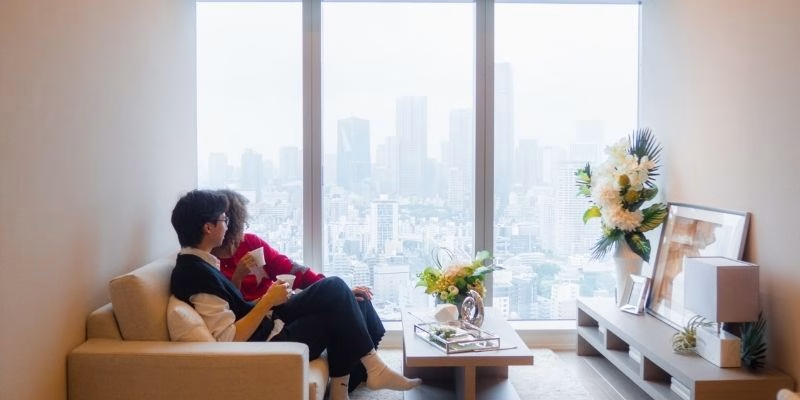Thinking of owning property in Tokyo? This practical guide is tailored for expats and foreign buyers, offering step-by-step insights on legal steps, financing, and choosing the right location. From working with English-speaking agents to navigating local rules, discover how to make smart, confident decisions in Japan’s housing market.
Why Buy a House in Tokyo?
Tokyo offers a stable real estate market with strong long-term value, making it one of Asia’s most attractive cities for homebuyers. While Tokyo apartment rental prices remain high, often ¥150,000 or more for a 1K apartment in Japan, owning a home can be more cost-effective in the long run, especially with low mortgage rates and strong legal protections for buyers, including foreigners.
The city’s excellent infrastructure, public transport, and clean, safe neighborhoods make it ideal for families and professionals. Many choose to settle in Tokyo suburbs like Setagaya or Suginami for more space and a quieter lifestyle.
In 2025, the median household income in Tokyo is estimated around ¥7.2 million per year, higher than the average salary in Japan, which hovers near ¥4.3 million. With solid earnings, particularly in urban areas, many residents view homeownership as a smart investment rather than continuing to rent.
With no restrictions on foreign ownership and a transparent legal system, buying a house in Tokyo is both practical and financially sound.

Tokyo real estate for foreigners
Are Foreigners Allowed to Purchase Real Estate in Tokyo?
Yes, foreigners can legally purchase real estate in Tokyo, including homes, apartments, and land, without facing legal restrictions. Japan stands out in Asia for allowing full property ownership by non-citizens, making it an attractive destination for international buyers and investors alike. Whether you’re planning to relocate or simply seeking a long-term asset, Tokyo’s property market offers accessible and secure opportunities. Here’s why owning real estate in Japan is within easy reach for foreigners:
- Foreign buyers are allowed to acquire land and housing in Tokyo without any special limitations or permissions.
- Japanese law grants equal ownership rights to both citizens and non-citizens, allowing foreigners to hold full legal title to real estate.
- There’s no need for a visa or residency status to purchase property, ownership does not require you to live in Japan or obtain long-term stay approval.
- Japan actively encourages foreign investment, especially in major urban areas like Tokyo, where the demand for quality housing remains consistently high.
Types of Houses Available in Tokyo
Considering making Tokyo your place to live? The city offers a diverse mix of housing options to match different lifestyles, whether you’re a growing family, an investor, or simply looking for a home with more privacy. Here’s a breakdown of the main types of houses you’ll find in Tokyo, and what makes each one unique.
Detached Houses (Ikkodate / 一戸建て)
If privacy, space, and independence top your list, a detached house, known in Japanese as ikkodate, might be the perfect fit. These standalone homes come with their own plot of land and are typically found in quieter residential neighborhoods.
- Ideal for: Families, long-term residents, or anyone seeking more room to live.
- Highlights: No shared walls, more freedom for renovations, often include a small garden or private parking.
- Keep in mind: Prices can be high in central areas, and land space is limited within city zones.
Terraced Houses and Duplex-Style Residences
For those wanting the feel of a house without the full price tag of a detached property, townhouses and duplexes offer a great middle ground. These homes are often part of a row or multi-unit structure but still provide the independence of owning your own space.
- Ideal for: Young couples, first-time buyers, or urban dwellers looking for affordability.
- Highlights: Lower price point, efficient layouts, and often located in well-connected neighborhoods.
- Keep in mind: Less privacy than detached homes, and you may share walls or exterior features with neighbors.
New-Build vs. Second-Hand Homes
One of the first choices you’ll face is whether to buy a brand-new home or a second-hand (pre-owned) property.
- New-build homes come with modern layouts, up-to-date earthquake safety standards, and minimal repair needs, perfect for those who want something move-in ready.
- Second-hand homes, on the other hand, are typically more affordable and available in more central or historic locations. Some may need renovations but offer great potential and character.
Preferred Neighborhoods for Purchasing a Home
Tokyo is a city of contrasts, where quiet residential streets meet vibrant cultural hubs. If you’re planning to buy a house, choosing the right neighborhood is just as important as finding the right property. Here are some of the most desirable areas for homeowners in the capital:
Setagaya & Suginami – Calm and Community-Oriented
Situated in the western part of Tokyo, Setagaya and Suginami are well-known for their laid-back atmosphere and spacious living. With plenty of parks, good schools, and low-rise housing, these districts are especially appealing to families.
- Highlights: Tree-lined streets, local markets, and a strong sense of neighborhood connection.
- Perfect for: Those seeking a serene lifestyle within commuting distance of central Tokyo.
Nakano & Kichijoji – Energetic with a Local Feel
Nakano and Kichijoji strike a balance between city convenience and a warm residential vibe. Known for their indie shops, artistic spirit, and friendly environment, these areas attract creatives and young families alike.
- Highlights: Lively shopping arcades, cultural events, and easy train access.
- Perfect for: Buyers who value personality, walkability, and a strong local identity.
Minato & Meguro – Prime, Prestigious, and Convenient
For those looking to invest in luxury and location, Minato and Meguro offer some of the most refined living experiences in Tokyo. These upscale neighborhoods are home to embassies, designer boutiques, gourmet dining, and international communities.
- Highlights: Elegant architecture, top-tier amenities, and strong long-term value.
- Perfect for: Professionals, expats, or anyone looking for a high-end home base close to the city’s core.
What Are the Typical Expenses When Buying a Home in Tokyo?
Buying a house in Tokyo comes with a wide range of price points, influenced by neighborhood, property condition, and whether you’re buying land, a completed home, or planning new construction. In prime locations like Minato, Shibuya, or Chiyoda, homes often come with a hefty price tag, frequently surpassing ¥100 million (around USD 700,000). On the other hand, if you’re open to living farther from the city center, areas like Adachi, Nerima, or Edogawa present far more budget-friendly choices, with houses typically starting from ¥30–50 million (roughly USD 200,000–350,000).
For those interested in building from the ground up, it’s crucial to consider both the land acquisition cost and the construction budget separately. While the value of land depends largely on location and accessibility, building expenses usually range between ¥200,000 and ¥400,000 per square meter, depending on the style, materials, and contractor.
Beyond the purchase itself, there are several additional charges to prepare for. These may include title registration, property acquisition tax, legal documentation fees, and real estate agent commissions (commonly around 3% of the transaction amount plus standard fees). Buyers should also account for home insurance, optional earthquake protection, and ongoing obligations like annual property taxes and urban planning levies. Altogether, these extra payments typically add 5–10% to the overall budget.
Navigating Tokyo’s housing market requires not only financial planning but also a clear understanding of both visible and hidden costs. With the right research, finding a home that fits your lifestyle and long-term goals is absolutely possible.

Cost of buying in Tokyo
A Detailed Walkthrough of the Home Buying Journey
Purchasing property in Tokyo becomes much easier when you understand each phase of the process. Below is a clear, structured breakdown that walks you through how real estate transactions typically work in Japan, from the initial search to receiving the keys.
Your journey starts by searching for a suitable home, either through licensed agents or reliable online platforms. Once you find a property that meets your needs, the next step is to submit a formal offer and begin discussing terms with the seller. If both sides come to an agreement, you’ll move forward with signing a purchase contract, which also requires a deposit, typically around 5–10% of the total price.
If financing is involved, you’ll then apply for a home loan, providing the necessary paperwork to the bank and waiting for approval. After your mortgage is confirmed, the final step is to complete the ownership registration at the Legal Affairs Bureau. Once this is done, you’ll officially receive the keys and take possession of your new home.
This process is transparent and designed to protect both buyer and seller. With guidance from an experienced agent or legal advisor, navigating Tokyo’s housing market can be both secure and straightforward.

Tokyo real estate process explained
Financing and Mortgage Options
If you’re planning to purchase a house in Tokyo but don’t have the full amount in cash, the good news is that many Japanese banks provide home loans to foreign nationals. While the application process involves specific conditions, financing is possible, even without permanent residency, if you meet the eligibility criteria.
Major lenders like SMBC, MUFG, Shinsei Bank, and Prestia offer mortgage services to non-citizens. Some institutions may prefer applicants with long-term residency, while others are open to individuals on work visas, provided they have a steady income and financial stability in Japan.
To qualify for a mortgage, you’ll typically need to prepare the following:
- A valid residence card or visa
- Proof of employment and income within Japan
- Copies of tax documents and recent bank statements
- Essential Elements of the Property Sales Contract
- A cosigner may be needed based on the lender’s criteria
When it comes to loan terms, interest rates in Japan remain among the lowest globally. Rates can be fixed or variable, often falling between 0.5% and 2.5%, based on the bank’s policy and your financial profile. Most lenders will request a down payment of 10–20%, and repayment periods usually range from 20 to 35 years, depending on your preference and age.
Though the paperwork may feel overwhelming at first, the process becomes manageable with proper guidance. Partnering with a bilingual real estate agent or mortgage consultant can make a big difference in finding favorable terms and navigating the system smoothly.
Important Points to Reflect on Before Making a Purchase
Before purchasing a home in Tokyo, it’s important to look beyond the price.
- Location & Convenience: Easy access to trains, schools, shops, and hospitals will improve daily life and support long-term property value.
- Age & Condition: Older homes may require repairs. Always check the structure, plumbing, and insulation.
- Ownership Type: Know if you’re buying freehold (full ownership) or leasehold (limited land rights), as this affects control and resale options.
- Disaster Risk: Earthquakes are common in Tokyo. Review hazard maps and make sure the building meets safety standards.
- Resale Value: Choose areas with future growth, good transport, and schools for better resale potential.
- Legal & Language Support: Work with bilingual professionals to fully understand contracts, taxes, and legal procedures.
Pros and Cons of Buying in Tokyo
Thinking about purchasing a house in Tokyo? Owning property in this vibrant city comes with distinct advantages and challenges. Knowing the advantages and disadvantages will guide you to a smarter choice. Let’s explore the main advantages and potential downsides to consider:
Advantages of Buying Property in Tokyo
- Complete Ownership and Control: When you buy a home, you gain full rights to modify, renovate, or rent out your property without needing approval from landlords or management. Detached houses especially offer freedom to customize your living space as you please.
- Building Equity and Potential Value Growth: Purchasing property allows you to build equity over time. Land values in Tokyo have shown steady appreciation, providing a long-term investment benefit despite some depreciation in building structures.
Drawbacks of Purchasing Real Estate in Tokyo
- High Upfront Costs: Beyond the purchase price, buyers must cover additional expenses like taxes, agency fees, and legal charges, which can add up to 6–10% of the property’s value.
- Maintenance and Depreciation Responsibilities: Owners are responsible for upkeep, repairs, and insurance. Japanese homes tend to have a shorter lifespan, often requiring renovations after 20–30 years, though the land itself typically retains value.
Final Tips for Foreign Buyers
When purchasing real estate in Tokyo, it’s wise to collaborate with licensed bilingual agents who can facilitate clear communication and guide you through the process. Engaging a judicial scrivener (司法書士) is also beneficial, as they provide expert legal support for contracts, registrations, and other formalities. It’s important to thoroughly check all agreements, fees, and terms before signing to ensure there are no surprises.
For those who prefer English assistance, websites like An Lac offer comprehensive listings and professional services designed specifically for foreign buyers.
Conclusion
Buying a home in Tokyo as a foreigner is achievable with the right guidance. Understanding the market, costs, and legal steps is key. Working with bilingual agents and using platforms like An Lac simplifies the process. Careful research and professional support ensure a smart investment and a comfortable new home in Japan’s capital.






Leave a Reply